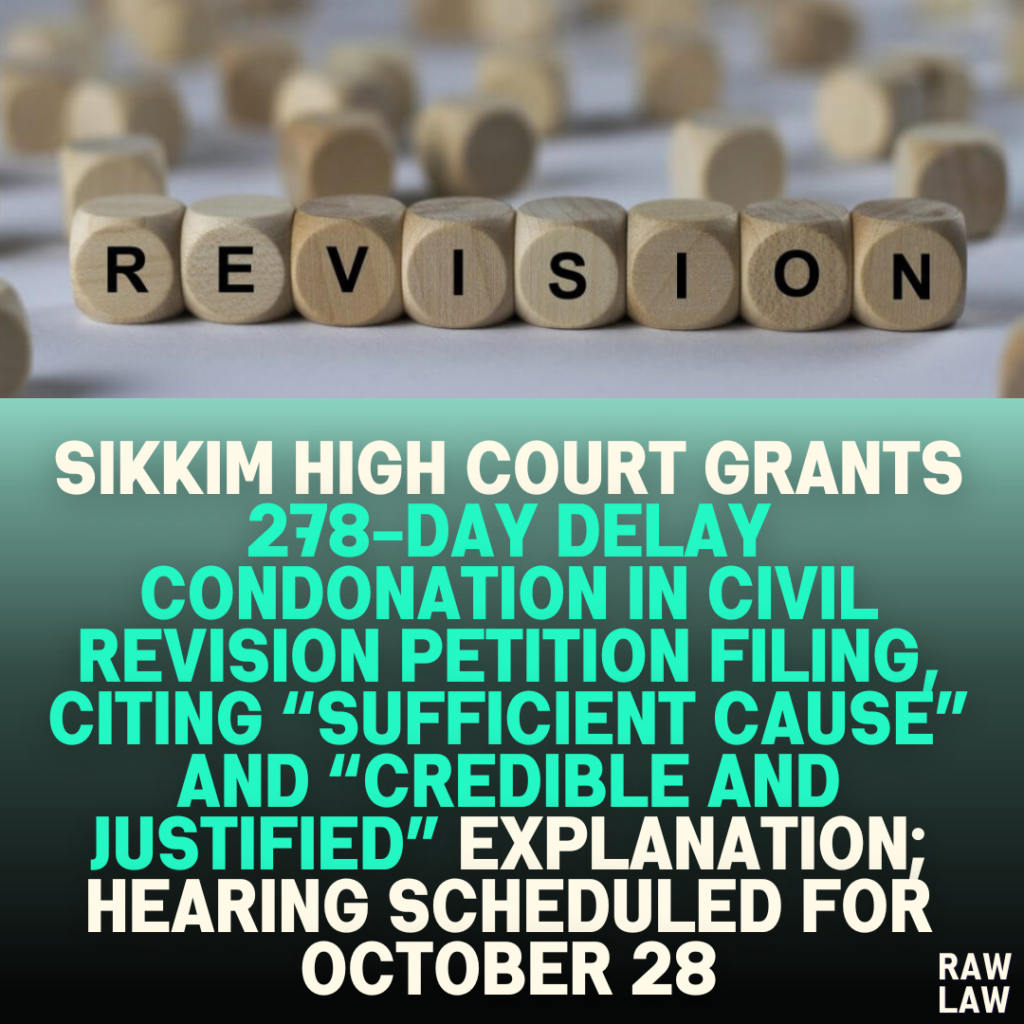Court’s Decision: The Sikkim High Court granted the applicant’s request for condonation of a 278-day delay in filing a Civil Revision Petition under Section 5 of the Limitation Act, 1963. The Court, noting that no serious objections were raised by the respondents’ counsel, held that “sufficient cause has been advanced by the Applicant explaining the delay.”
Facts: The applicant filed an application seeking condonation of a 278-day delay in filing a Civil Revision Petition. This delay occurred due to an error regarding the date of filing the initial petition under Article 227 of the Indian Constitution. Initially submitted on November 21, 2023, the petition required certain rectifications, which were completed and refiled on March 26, 2024. The Registry condoned this delay upon verification of the corrected filing date.
Issues:
- Whether the applicant demonstrated sufficient cause for condoning a 278-day delay.
- The extent to which procedural delays, if rectified appropriately, affect the timelines under the Limitation Act.
Petitioner’s Arguments: The petitioner argued that the delay was due to necessary corrections in the original filing, which were duly addressed. This delay, therefore, was unintentional and justified by the procedural requirements for rectification as mandated by the Registry.
Respondent’s Arguments: The respondents initially pointed out inconsistencies regarding the date of filing as reflected in Paragraph 3 of the application. However, after reviewing the Court’s records and the Registry’s clarification, they raised no significant objections to condoning the delay.
Analysis of the Law: Section 5 of the Limitation Act provides discretionary power to condone delays if sufficient cause is demonstrated. The Court emphasized the importance of balancing procedural technicalities with substantive justice, particularly when errors arise from rectification needs identified by the Registry. The decision underscores the judiciary’s approach toward accommodating genuine procedural delays in line with Section 5.
Precedent Analysis: The Court did not explicitly refer to any prior judgments. However, it implicitly followed judicial precedent that favors leniency in condoning delays where justified by procedural requirements and sufficient cause is shown.
Court’s Reasoning: The Court, after reviewing the arguments and the records, concluded that the applicant’s explanation of the delay was credible and justified. It found the delay to be sufficiently explained by the circumstances surrounding the rectifications. As there were no substantial objections from the respondents, the Court found it appropriate to grant the condonation.
Conclusion: The Court allowed the application for condonation of the 278-day delay, directing that the Civil Revision Petition be registered and scheduled for hearing on October 28, 2024.
Implications: This ruling emphasizes the Court’s discretion under the Limitation Act in condoning delays where procedural rectifications are at issue. It signals a supportive stance toward applicants facing delays due to necessary compliance with procedural rectifications, particularly when met with minimal opposition from respondents. This decision reaffirms the judiciary’s focus on substantial justice over procedural formalities.




Pingback: Bombay High Court Quashes Rejection of Rehabilitation Entitlements, Orders Fresh Consideration of Claims Under Second and Third Schedules of 2013 Act in National Highway Land Acquisition Cases - Raw Law